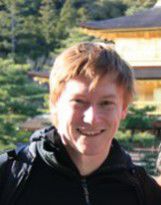Two University of Arizona astronomers were selected among scientists throughout the nation to receive Early Career Research Awards that will allow them to continue their investigations into dark energy and dark matter, the university announced Thursday.
Assistant professors of astronomy Elisabeth Krause and Tim Eifler were selected by the U.S. Department of Energy’s Office of Science to receive $750,000 over five years to support their research. The department selected 73 scientists for this year’s Early Career Research Program, which is designed to support researchers early in their career, when they are doing their most formative work.
“Supporting our nation’s most talented and creative researchers in their early career years is crucial to building America’s scientific workforce and sustaining America’s culture of innovation,” Energy Secretary Rick Perry said in a statement. “We congratulate these young researchers on their significant accomplishments to date and look forward to their achievements in the years ahead.”
For Krause and Eifler, who both joined the UA’s Steward Observatory in August 2018, the award means a chance to continue researching some of the most mysterious parts of the universe. They have individually worked on projects that aim to improve scientific understanding of dark energy, an unknown force believed to be making the universe larger.
“This is really fantastic news and a great recognition,” Eifler said. “It enables a focused research effort in cosmology over the coming five years.”
Since the discovery of dark energy in 1998, scientists have been working to understand how its underlying physics can cause the universe to expand.
Krause and Eifler are involved in several collaborations that aim to explore this phenomenon, including the Dark Energy Survey and the Large Synoptic Survey Telescope.
The Dark Energy Survey is the largest ongoing imaging survey that aims to document the expansion of the universe. Since opening in 2013, it has surveyed more than 300 million galaxies. LSST, which is currently being built in Chile, is another survey telescope that will be capable of reaching even greater depths of the universe. Set to begin its mapping of the universe in 2022, LSST will survey 20 billion galaxies.
The data collected from these will be crucial to the research that Krause and Eifler conduct over the next five years.
“It’s an unusually long duration, so having a consistent stream of funding means we can take on bigger projects,” Krause said. “It’s also very nice recognition after many years of work.”







